|
|
|
Sort Order |
|
|
|
Items / Page
|
|
|
|
|
|
|
| Srl | Item |
| 1 |
ID:
153907
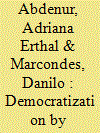

|
|
|
|
|
| Summary/Abstract |
The field of international development has undergone major shifts as South–South cooperation expands. New questions are being raised about the political implications of this cooperation, including with respect to democracy and human rights. In this paper, we analyse the role of Brazil, a democratic provider of South–South cooperation, in fomenting these principles in Africa. We find that explicit democracy promotion makes up a minority of Brazil’s cooperation with Africa. However, Brazil also engages in social policy initiatives which, despite not being labelled as democracy and human rights promotion, are inspired by Brazil’s own experiences with re-democratization—what we refer to as “democratization by association”. We argue that these initiatives—mostly geared towards institution-building in areas where Brazil seeks to promote itself as a hotbed of policy innovation—are disembedded from the political context in which they arose in Brazil. While this disembeddedness allows the Brazilian state to maintain its official discourse of non-interference, it also makes the political impact of Brazilian cooperation in Africa highly uncertain.
|
|
|
|
|
|
|
|
|
|
|
|
|
|
|
|
| 2 |
ID:
145872
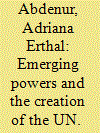

|
|
|
|
|
| Summary/Abstract |
What role did the present emerging powers play in the creation of the United Nations? Drawing on Plutarch’s ‘ship of Theseus’ paradox, this article analyses how, and the extent to which, Brazilian, Chinese and Indian representatives influenced key debates leading up to the UN’s foundation. At the time Brazil was ruled by a fascist-inspired military regime, yet it had supported Allied efforts during World War II; China was split among Nationalists and Communists; and India was still a British colony. These national delegations reflected the main social and political struggles of their respective countries. While these three countries were able to influence the design, procedures and substance of the burgeoning organisation, their agency was limited by their primary focus on internal issues. By comparison, in the present era they have been able to extend their influence in global governance debates by coordinating certain reformist positions.
|
|
|
|
|
|
|
|
|
|
|
|
|
|
|
|
| 3 |
ID:
136048
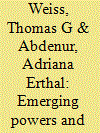

|
|
|
|
|
| Summary/Abstract |
Since the outset, in the aftermath of World War II, the United Nations development system (unds) has constituted an essential pillar of the world organisation’s activities, along with those devoted to peacekeeping, humanitarianism, human rights and justice. Adaptations notwithstanding, serious questions remain about its effectiveness and capacity to represent adequately the aspirations of ‘we, the peoples’ – the opening words of the UN Charter – particularly in the global South. Although developing countries have joined forces at different stages in the international arena – including through the Non-Aligned Movement (nam) and the Group of 77 (G77) – to increase their voices within the system, over the past decade a new twist has been added, the visibility of emerging powers. This reality not only reflects the latter’s growing role as providers of development cooperation but also their criticism of the existing architecture for global economic governance.
|
|
|
|
|
|
|
|
|
|
|
|
|
|
|
|
| 4 |
ID:
136056
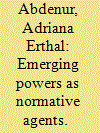

|
|
|
|
|
| Summary/Abstract |
Institutions are frequently thought of as ‘socialising’ member states into pre-established norms. However, this influence is not necessarily a one-way street; members can also affect institutions, whether individually or collectively. This article analyses the behaviour of two emerging powers – Brazil and China – within the field of international development. What roles have these two states played in shaping global development norms? The article examines the key motivations, positions, and initiatives taken by Brazil and China, with special reference to the UN development system (unds). Whereas Brazil and China’s early behaviour within the unds diverged significantly, in the post-cold war period both have become increasingly interested in – and capable of – influencing UN norms. However, despite greater involvement in UN development negotiations, these countries’ leverage in normative debates originates outside of the unds, through their South–South cooperation programmes. The current diversification of platforms through which the norms of international development are negotiated may enhance the influence of emerging powers, although their ability to channel this influence effectively will depend on their capacity for norm entrepreneurship, rather than mere norm blocking.
|
|
|
|
|
|
|
|
|
|
|
|
|
|
|
|
| 5 |
ID:
151321
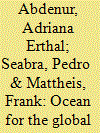

|
|
|
|
|
| Summary/Abstract |
In this article, we analyse an instance of revitalisation of a dormant interregional organisation dating back to the Cold War: the Zone of Peace and Cooperation of the South Atlantic (ZOPACAS), initially launched by South American and African states in 1986 through the UN General Assembly. Drawing on the concepts of “consensual hegemony” we argue that the current phase of ZOPACAS’ existence is characterised by Brazil's efforts to rekindle it, thus reflecting its aspiration to create a new space of influence. Rather than pursuing more traditional forms of regional leadership, Brazil uses ZOPACAS as part of a persuasion-based strategy based on regional multilateralism that is designed in antagonism to other international organisations and Western powers. However, this strategy also faces important limitations resulting from resource constraints, lack of institutionalisation and an excessive exclusionary focus on minimising the role of global powers with interests in the region.
|
|
|
|
|
|
|
|
|
|
|
|
|
|
|
|
| 6 |
ID:
130872
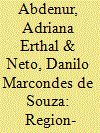

|
|
|
|
|
| Publication |
2014.
|
| Summary/Abstract |
Far from being 'naturally' delineated by geography or bound solely through shared culture, regions are actively constructed by states and other actors pursuing specific interests. In this article, we analyse the region-building efforts of two rising powers - Brazil and India - as they work to project power and enhance their influence within the Atlantic and Indian oceans, respectively. Through a comparison of their behaviours within their maritime spaces - including naval build-up, international cooperation, and efforts to revive institutions such as ZOPACAS and IOR-ARC - we argue that Brazil and India are paying increasing attention to oceanic rims, albeit for somewhat disparate reasons. While India is increasingly concerned with the role of China within the Indian Ocean, for which it has had to rely on US support, Brazil is primarily driven to protect its oil and to minimise the role of the US and NATO in the South Atlantic. In both spaces, however, the rise of so-called non-traditional threats, including piracy, has further motivated these states' maritime power strategies. The analysis suggests that, within the context of the post-Cold War period, rising powers have begun redefining their strategic regions in terms of their maritime perimeters as a way to project power and influence beyond their continental vicinities.
|
|
|
|
|
|
|
|
|
|
|
|
|
|
|
|
| 7 |
ID:
145021
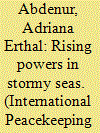

|
|
|
|
|
| Summary/Abstract |
In February 2011, after five years of NATO powers rotating at the helm of UNIFIL's Maritime Task Force, its command was handed over to Brazil. What factors have motivated Brazil's participation, especially in light of the geographic distances separating Brazil and Lebanon and deepening crisis in Brazil? This article analyses Brazil's engagement with UNIFIL in light of key foreign policy and defence priorities and identifies three key motivations: the aspiration to participate more directly in Middle East security issues; the historical and political ties between Brazil and Lebanon; and the chance to expand Brazil's naval capacity in accordance with its new naval defence strategy within the South Atlantic. More recently, however, economic slowdown and political turbulence domestically have created new challenges for Brazil's ability to maintain its contributions to UN peacekeeping. These shifts offer an opportunity to refine the use of the ‘rising powers’ concept in the study of international security.
|
|
|
|
|
|
|
|
|
|
|
|
|
|
|
|
| 8 |
ID:
140419


|
|
|
|
|
| Summary/Abstract |
How do rising powers engage in norms entrepreneurship on issues of global relevance? This article analyzes Brazil's efforts to mobilize support for international regulation of electronic espionage. More specifically, the article examines Brazil's reframing of electronic espionage as an issue of development and human rights (rather than merely a security one) as part of an effort to trigger a norms cascade that would significantly modify what is viewed as acceptable use of the Internet by state agencies. Through this reframing, Brazil has begun to push for broader Internet governance reform as a prerequisite for curbing electronic espionage. In assuming the role of norms entrepreneur, Brazil incurs both opportunities and risks to its role and image as an innovative multilateralist.
|
|
|
|
|
|
|
|
|
|
|
|
|
|
|
|
| 9 |
ID:
155708
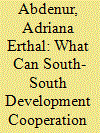

|
|
|
|
|
| Summary/Abstract |
Until it began waning due to economic crisis and political turmoil on the domestic front, in Brazil’s rapidly expanding South-South development, cooperation often has been promoted by government officials as contributing to stability and prosperity in partner states. It is unclear, however, how this development cooperation intersects with the country’s involvement in UN peace operations. This article examines the role of Brazilian South-South technical cooperation across two contexts. In Haiti, Brazil has led the military component of the MINUSTAH, whereas in Guinea-Bissau, it has helped to spearhead peacebuilding efforts by the international community. In both cases, Brazil has tried to substantiate its critique of the UN’s securitization by providing technical cooperation across a variety of sectors. The analysis shows that this cooperation is too fragmented, subject to interruptions, and disconnected from UN-led efforts to make a considerable contribution to a sustainable peace. However, better internal coordination and stronger ties to UN initiatives could boost the contribution of Brazil’s Brazilian South-South development cooperation to a lasting peace.
|
|
|
|
|
|
|
|
|
|
|
|
|
|
|
|
|
|
|
|
|